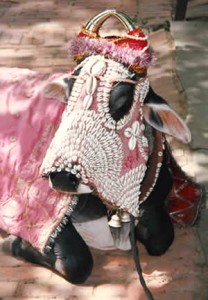
Over the Christmas break a conversation amongst family and friends touched on Hinduism and the worship of cows. My own curiosity led me to want to find out a little bit more on why and how the cow was worshipped in the Hindu religion. After finding it interesting, I thought I might share with you a little bit of the information that I found out. Hinduism is one of the oldest living religions and is practiced by the majority of people in India and Nepal, making it the third largest religion practiced today.
In Hinduism all living creatures are considered as sacred and the cow is the animal used to symbolise this respect for all creatures. Hindus do not “worship” the cow, however they respect, honour and adore the cow. The cow is considered a symbol of life, grace and abundance and is not to be killed. The cow is a gentle, ever giving creature and according to some Hindu scriptures is the mother of all creatures. The cow is adored and worshipped because they are so generous in what they give to humans and they take so little.
Cows are very significant in the lives of the Hindu people. Most Hindus that live on a rural property will have a dairy cow that they often treat like a member of the family. Not only do Hindus drink the cows milk, use it to make butter, cream and other products, they also use the cow dung for building purposes, as a fuel for fire, source of energy and in making tilak (forehead marking). The dung is also spread on the floor as its antiseptic properties keep rodents and insects away. The cows urine is also considered useful in treating several diseases as it contains vitamins, hormones and elements. The cow urine and cow dung are also used in a number of Hindu ceremonies. Cows are often considered a symbol of good fortune and are often walked through a house during a house warming ceremony.
Interesting though, is that in India it does not always seem that the cows are treated or considered as “sacred”. Visitors are often surprised to see the “sacred” cows wandering the streets and eating garbage out of the gutters. Although they are not treated poorly, the day to day treatment of the cows is nothing special. However, there are a number of traditional Hindu festivals in which the cow plays a special part and is honoured by the Hindu people.
One of these festivals that worships the cow is the Pongal Festival. It is a four-day long celebration that takes part in Tamil Nadu, southern state of India and is about giving thanks to nature. This festival is the only Hindu festival that follows the solar calendar and always starts on the 13th of January. The third day of the festival is known as Mattu Pongal, and is meant to give thanks to the cows and buffaloes that plough the land. The cattle are washed, dressed, painted and decorated in multi-coloured beads, flower garlands and bells. The cattle are fed pongal and taken to the village centres where young men will race each others cattle.The most significant festival in India in which cows are worshipped is Gopastami. This is the festival of the cow and takes place on the eighth day of the bright moon night during the Kartik (October-November) month of the Indian Vaishnava calendar. During this day cows are bathed and cleaned early in the morning and then decorated with paints, flowers, jewellery, clothes and fragrance. The cow is then offered food, grass, water and jaggery (unrefined dark sugar) and then lead on a procession where people can honour and worship them and give gifts to the herders.
Cows are a very significant and important part of various cultures around the world and I am happy that I was able to find out a little bit more information about the Hindu culture and the important role that cows play in their life. I hope you enjoyed reading about it and if you would like to find any out more information please follow the links below to the sites where I sourced my information from.
Until next time,
Bec
Information has been sourced from;
http://www.bbc.co.uk/religion/religions/hinduism/
http://www.nhsf.org.uk/index.php?option=com_content&view=article&id=526:..
http://www.ehow.com/facts_5297547_holy-cows-hindu.html
http://www.patheos.com/Library/Answers-to-Frequently-Asked-Religion-Questions/Do-Hindus-worship-cows.html
http://www.pongalfestival.org/pongal-festival.html

Bec : Re your article on the Hindu worship of cows> Sorry to be the bearer of bad news, but recently in Nepal a festival has been held with the mass slaughter of not only cows but pigeeon,dove, roosters, chickens,goats et al. This festival is held every 4 or 5 years, with thousands of animals slaughtered, all in the name of religion.The details can be found on ABC Australia website.
Hi Garry,
Thank you for your comment. This article was written to give a generalised insight into the majority of Hindu denominations and their traditions of worshipping cows. Although animal sacrifice is typically forbidden in Hinduism I am aware of a Hindu denomination known as Shaktism in which animal sacrifice does take place in order to worship the goddess Devi, as is the case in the Gadhimai Mela festival you mentioned.
I appreciate you taking the time to respond to my blog.
Kind Regards
Bec